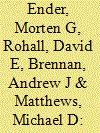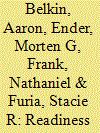|
|
|
Sort Order |
|
|
|
Items / Page
|
|
|
|
|
|
|
| Srl | Item |
| 1 |
ID:
109950


|
|
|
|
|
| Publication |
2012.
|
| Summary/Abstract |
The authors investigate a gap in attitudes toward homosexuals in the U.S. military among a select group of people-American civilian undergraduates, Reserve Officer Training Corp (ROTC) cadets, and cadets at military academies. Using a subsample (N = 3057) of data from the Biannual Attitude Survey of Students (BASS), being a military academy cadet is associated with the strongest agreement for barring homosexuals from serving in the military, followed by ROTC cadets and civilians. These trends continue when controlling for respondents' sex and political affiliation-the two most significant predictors of agreeing to bar homosexuals from military service. A small reduction in agreement for barring was found among academy cadets over time.
|
|
|
|
|
|
|
|
|
|
|
|
|
|
|
|
| 2 |
ID:
138757


|
|
|
|
|
| Summary/Abstract |
One of the most prominent debates over minority participation in the military has been whether or not inclusive policies would undermine operational effectiveness. While the adoption of inclusive policy has tended to indicate that minority participation does not compromise effectiveness, the question has not yet been tested in the context of transgender military service. In this paper, we conduct the first-ever assessment of whether policies that allow transgender troops to serve openly have undermined effectiveness, and we ask this question in the context of the Canadian Forces (CF), which lifted its transgender ban in 1992 and then adopted more explicitly inclusive policy in 2010 and 2012. Although transgender military service in Canada poses a particularly hard test for the proposition that minority inclusion does not undermine organizational performance, our finding is that despite ongoing prejudice and incomplete policy formulation and implementation, allowing transgender personnel to serve openly has not harmed the CF’s effectiveness.
|
|
|
|
|
|
|
|
|
|
|
|
|
|
|
|
| 3 |
ID:
124059


|
|
|
|
|
| Publication |
2013.
|
| Summary/Abstract |
Prior to the repeal of "don't ask, don't tell" (DADT) on September 20, 2011, many observers predicted that allowing lesbian, gay and bisexual troops to serve openly would harm the military, and a group of more than 1,000 retired general and flag officers predicted that repeal could "break the All-Volunteer Force." This study is the first scholarly effort to assess the accuracy of such predictions about the impact of DADT repeal on military readiness. We conducted our research during the half-year period starting six months after repeal and concluding at the one year mark, and we pursued ten separate research strategies including in-depth interviews, survey analysis, on-site field observations, pretest/posttest quasi experimentation, secondary source analysis, and a comprehensive review of media articles. Our goal was to maximize the likelihood of identifying evidence of damage caused by repeal, and we made vigorous efforts to collect data from repeal opponents including anti-repeal generals and admirals, activists, academic experts, service members and watchdog organizations. Our conclusion, based on all of the evidence available to us, is that DADT repeal has had no overall negative impact on military readiness or its component dimensions, including cohesion, recruitment, retention, assaults, harassment, or morale. If anything, DADT repeal appears to have enhanced the military's ability to pursue its mission.
|
|
|
|
|
|
|
|
|
|
|
|
|
|
|
|
|
|
|
|
|